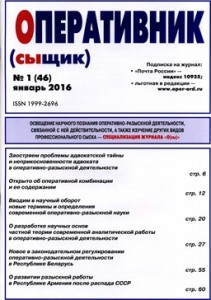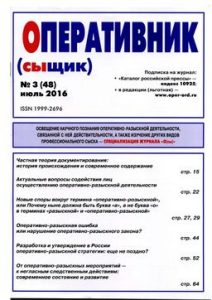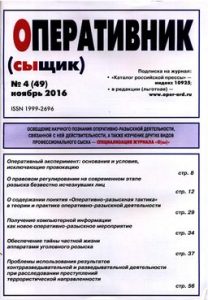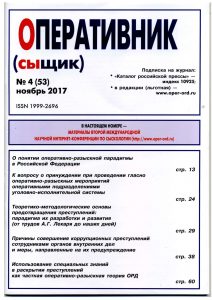Field Investigator (Sleuth). Issue No. 4 (53) for 2017
History of Professional Investigation and Operative Search Activity
Vladimir Nikolaevich Chisnikov, Member of the Editorial Board’s Foreign Section at O(sy), Ph.D. in Law, Associate Professor, (Kiev, Ukraine), e-mail: vchisnikov@ukr.net.
Genesis of surveillance service: from peepers to secret service agents (ХVІІІ—beginning of ХХ вв.).
Annotation. The author describes the main stages of Russia’s surveillance service formation and development during the XVIII—beginning of XX centuries.
Key words: police department, surveillance, secret service agents, the Seventh department, peepers, the Third special office, criminal investigation, trackers.
Problems of Theory and Practice of Modern Operative Search Activity
Basic problems of syskologia formation
Boris Aristarkhovich Spasennikov, Leading Researcher at Scientific Research Institute, FSIN of Russia (Moscow), Member of «O(sy)» editorial board, Doctor of Law, Professor, e-mail: borisspasennikov@yandex.ru.
On methodology, principles, language, subjects of operative search science and some other provisions (the author’s point of view on the second book of the third volume of the monograph by A.Yu. Shumilov «Operative search science in the Russian Federation»).
Annotation. The author analyzes the contents of the second book of the third volume of the monograph by A.Yu. Shumilov «Operative search science in the Russian Federation» put as the basis for the discussion on the second Internet conference on syskologia.
The author gives his comments on a number of provisions of the monograph, in particular on methodology, principles, language and subjects of operative search science.
A conclusion on a great significance of this scientific work for the formation of operative search science (syskologia) both in the Russian Federation and other states is drawn.
Key words: methodology, monograph by A.Yu. Shumilov «Operative search science in the Russian Federation», operative search activity, operative search science, principles, subject, syskolog, syskologia, the language of science.
Alexander Yulievich Shumilov, Russian Customs Academy, Professor of the Chair of Operative Search Activity at the Law Enforcement Institute, Doctor of Law, Professor, e-mail: oper-ord@mail.ru.
On the notion of operative search paradigm in the Russian Federation, its contents and formation of scientometric studies.
Annotation. The problem of operative search paradigm formation in the Russian Federation is considered in the article. A historical excursus of its formation is carried out and its definition is given. The contents of operative search paradigm is exposed. On the basis of scientometric studies specialists whose thoughts and scientific works lay in the basis of a new operative search paradigm formation in the Russian Federation are determined.
Key words: scientometrics, operative search activity, operative search science, operative search paradigm, syskolog, syskologia.
Problems of certain conceptions, doctrines and theories of syskologia under formation
Alexei Vyacheslavovich Agarkov, head of the chair of operative search activity, law faculty, Vladimir Law Institute, FSIN of Russia, Ph.D. in Law, Associate Professor, e-mail: agarkov2107@rambler.ru.
On the issue of coercion when carrying out operative search activities openly by the operational units of the criminal-executive system (An invitation for discussion).
Annotation. As part of the examination of applied issues of knowledge, the author continues the scientific discussion on the admissibility of coercion in the course of open operative search measures. It is concluded that the measures of operative search coercion are possible only in cases when they are stipulated by other legislative acts.
Key words: publicly, operative search activity, operative search legislation, operative search measures, operational units, coercion, syskologia.
Sergei Pavlovich Zhdanov, Associate Professor at the Chair of Criminal Law Disciplines, Russian Customs Academy (Lyubertsy, Moscow region), Ph.D. in Law, e-mail: zhdanov120009@yandex.ru.
Can a specialist be the subject of operative search science?
Annotation. At the 2 international scientific Internet conference «10 years of syskologia formation: reality and perspectives» and after a thorough study of many volumed monograph by A.Yu. Shumilov — our Master and the first syskolog in the Russian Federation, the problem was put forward if a specialist can be the subject of operative search science.
Key words: operative search activity, operative search science, speciologia, specialist, special learning approaches, special knowledge, subject, syskolistics, syskologia.
Pyotr Ivanovich Ivanov, Member of «O(sy)» editorial board, Doctor of Law, Professor, Honored Lawyer of the Russian Federation, tel. 8-964-554-9565,
Artyom Sergeevich Shemetov, Candidate for a Ph.D. Degree in Law (Adjunct), Academy of Management, Russian Ministry of Internal Affairs (Moscow), е-mail: a.s.shemetov@gmail.com.
Theoretical and methodological foundations of crime prevention: paradigm of their formation and development (from the works of A.G. Lekar to the present day).
Annotation. Theoretical and methodological foundations of crime prevention are considered in the article. A special contribution to their formation by professor A.G. Lekar’s scientific works is shown. The opinion is given that the theory of operative search activity is moving forward but slowly in the direction of operative search science formation.
Key words: A.G. Lekar, methodological basis, operative search activity, paradigm, crime prevention.
Yaroslav Grigoryevich Ishchuk, legal counsel in the legal Department of the Ministry of internal Affairs of the Russian Federation in the Ryazan region, candidate of juridical Sciences (Ryazan), е-mail: yar-vyatka@yandex.ru.
Personality, as an object of operative search crime prevention.
Annotation. The importance of the theory of the criminal personality in the context of operative search prevention of crimes is determined in the article. Personality is considered as the central link of the specified activities.
Key words: criminological prognosis, personality of a criminal, object of prevention, operative search prevention.
Oleg Alekseevich Kisly, senior lecturer at the Chair of organization of operative search activity, Management Academy of the Ministry of Internal Affairs of Russia (Moscow), Ph.D. in Education, e-mail: razboiniki@yandex.ru.
Reasons for committing corruption crimes by internal affairs officers and measures aimed at their prevention.
Аnnotation. Reasons for committing corruption crimes by internal affairs officers are considered in the article. Measures aimed at their prevention are proposed.
Key words: corruption crime, ensuring safety, обеспечение собственной безопасности, operative search activity, bodies of internal affairs, prevention, reasons for committing crimes, employee.
Vladimir Afanasievich Kozlov, Senior Prosecutor at the department of Jural Administration, the General Prosecutor’s Office of the Russian Federation (Moscow), Doctor of Law, Professor, е-mail: jevgiar@rambler.ru.
Coming back to the issue of developing an automated work place «АРМ-operative officer».
Annotation. Taking into account provisions of forensics and contemporary operative search science the author considers the necessity of a scientific project of automated work place «АРМ-operative officer». Recommendations of practical use on its introduction are proposed.
Key words: automated work place, forensics, operative search activity, operative search science.
Valery Cheslavovich Rodevich, Candidate for doctor’s degree at scientific pedagogical faculty, Academy of the Ministry of Internal Affairs of the Republic of Belarus (Minsk), Ph.D. in Law, Associate Professor, е-mail: ord.by@tut.by.
Detection deontology (ethics) and its place in operative search science.
Annotation. Moral and ethic principals of operative search activity are basic in revealing cognitive and action functions of syskologia. In this respect the theory on duty as it is (detection ethics) is of great importance revealing moral relations in the specified activity. The author shows how the process of forming deontologic knowledge can influence the elimination of some contradictions and drawbacks in operative search activity.
Key words: deontology, moral, ethics, operative search activity, operative search science, relations, professional duty, detection ethics, detection activity, syskologia, human being.
Vladimir Anatolievich Serednev, Lecturer at the Chair of Law, Philosophy and Social Disciplines, Faculty of Economics and Law, Arzamas Branch of Nizhny Novgorod State University named after N.I. Lobachevsky (Arzamas), e-mail: naganov1910@mail.ru.
To the content of the «inner world» of the personality of a «scout» (on the positive aspects of «professional deformation»).
Annotation. The psychology of an operational employee and his attitude to the operational work are considered in the article. It is proposed to use the mechanism of recruitment blackmail technologies that contribute to the closed («secret») departmental regulations governing the organization and tactics of operational work, as a legitimate method of recruitment. The phenomenon of «professional deformation» of an operational employee is regarded in the article and the positive aspects of this phenomenon, which are: high professionalism of the operational personnel and the specific form of thinking that is different from a layman are ascertained.
Key words: agent, recruitment, counterintelligence, «professional deformation», operative search activity, psychology, intelligence activities.
Nikolay Pavlovich Frolkin, Leading Research Worker of VNII IBiS (Moscow), Ph.D. in Law, Associate Professor, e-mail: oper-ord@mail.ru.
Using polygraph in operative search activity: legal and criminalistic aspects.
Annotation. Legal and criminalistic aspects of using polygraph in operative search activity are considered in the article. Specific amendments to the Federal law «On operative search activity» concerning polygraph application are proposed.
Key words: forensics, operative search activity, operative search measures, poll, polygraph, right.
Igor Lvovich Khromov, Professor of the Department of the ORD-ST, Moscow University of the Ministry of the Interior of the Russian Federation named after V.Ya. Kikot, Doctor of Law, Professor, e-mail: marina@kfk-tamp.ru.
Using special knowledge in disclosing crimes as a private theory of operative search activity.
Annotation. The development of the institute for the use of special knowledge in operative search activity is considered. The use of special knowledge, as a private operative search theory, is aimed primarily at increasing the effectiveness of prevention, detection, investigation and disclosure of crimes. The subject of the private theory, its object and structure, as well as the regularities of obtaining operationally significant information, which are the subject of a particular theory of the use of special knowledge in the system of the RDD, are studied. Basic directions of application of special knowledge are shown.
Key words: information and telecommunication networks, international extremism and terrorism, illegal religious and nationalist organizations, operative search activity, disclosing crimes, specialist having peculiar knowledge, special knowledge, functions of using specialized knowledge, private theory.
Gennadiy Sergeevich Shkabin, Associate Professor of Criminal Law Chair, Moscow University of the Ministry of Internal Affairs of the Russian Federation named after V.Y. Kikot, PhD, Associate Professor, e-mail: uprzn@ya.ru.
Limits for causing harm at conducting operative search measures.
Annotation. The author’s definition of the limits of causing harm in the conduct of operative search activities is suggested. Depending on the degree of certainty, they are divided into definite and relative. The first group includes a ban on causing harm to specific, most important objects. Relative limits consist in inadmissibility of causing harm to various objects, but under certain conditions.
Key words: harm, objects of criminal law protection, operative search activities, limits for causing harm.
Operative Search Activity Abroad. International Cooperation
Ivan Ignatyevich Basetsky, Editor-in-Chief of the Magazine «Bulletin of the Academy of Ministry of Internal Affairs of the Republic of Belarus» (Minsk), Member of the Foreign Section of the Editorial Board at O(sy), Doctor of Law, Professor, Honored Lawyer of the Republic of Belarus,
Maria Arkadyevna Vakulchyk, Senior Lecturer of the Chair of Criminal Investigation, the Academy of the Interior Ministry of the Republic of Belarus, e-mail: ma.vakulchik@gmail.com.
Experience in coordinating crime counteraction in the Republic of Belarus.
Annotation. The experience in activity coordination between law enforcement and other state agencies and organizations of the Republic of Belarus in counteracting crime has been examined. The analysis of the material of the Interdepartmental Commission on Combating Crime, Corruption and Drug Addiction under the Security Council of the Republic of Belarus is given.
Key words: coordination of crime counteraction, corruption, drug abuse, crime.
Review Page
Victor Ivanovich Gladkikh, Head of the Chair of Criminal Law and Process, State University of Management (Moscow), Doctor of Law, Professor, Honored Lawyer of the Russian Federation, tel.: 8-495-722-0426.
Review of the monograph by Doctor of Law, Professor S.V. Bazhanov (Bazhanov, S.V. «The doctrine of the search»: monogr. / S.V. Bazhanov, Moscow: Yurlitinform, 2017. — 168 p.).
Annotation. The monograph by S.V. Bazhanov «The doctrine of the search» is reviewed. The reviewer came to the conclusion about the importance of this book for the theory and practice of operative search activity and criminal process.
Key words: search, search activity, search subjects, search objects, bodies that carry out operative search activity, investigative bodies, investigator.
Index of the Articles Published in 2016
№ 1(46) January 2016 |
№ 2(47) April 2016 |
№ 3(48) July 2016 |
№ 4(49) November 2016 |

